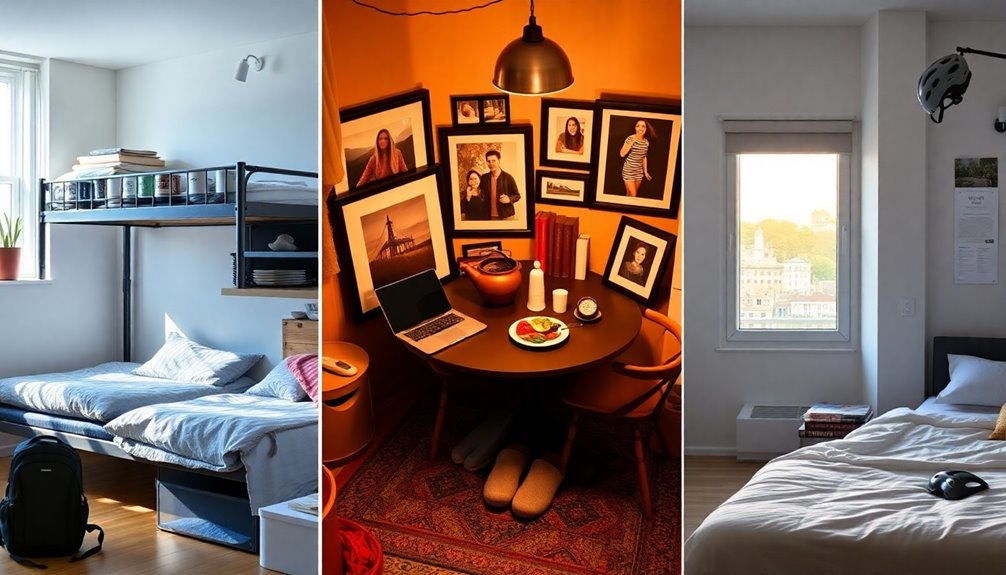
You can find budget student rooms near language schools by searching school housing boards, local student groups, and multiple listing sites, and by contacting schools for recommendations. Prioritise location, included bills, and commute time, and be ready to act fast on good deals. Inspect rooms or ask for clear photos and lease details, and meet potential roommates when you can. Start with shortlists and flexibility, and you’ll uncover practical options and tips to help you choose wisely if you want more.
Highlights
- Check language schools’ housing boards and student services for vetted, budget-friendly room listings near campus.
- Use multiple platforms and local student groups to compare prices, availability, and commute times quickly.
- Prioritize rooms with included bills and wifi to avoid unexpected monthly expenses.
- Inspect rooms or request clear photos, lease terms, and meet roommates to ensure compatibility and transparency.
- Set a monthly rent ceiling, track utilities, and prefer shared flats or homestays for lower overall costs.
Understanding Typical Student Living Costs in Ireland
If you’re planning to study in Ireland, it helps to know what typical living costs look like so you can budget realistically from day one. You’ll find student accommodation ranges from shared flats and homestays to student halls, each with different price points and flexibility. Think about location, commute time to language schools, and what’s included—bills, internet, or laundry. Explore housing options early to secure cheaper deals and avoid stress. Prioritize freedom by choosing arrangements that let you study, socialise, and travel without costly commitments. You’ll feel more confident making choices that match your lifestyle and budget.
Monthly Budget Breakdown for Rent, Utilities, and Food
Start by listing your non-negotiables—rent, utilities, and food—so you’ll know what portion of your income or savings they’ll eat up each month. Calculate rent as a percentage of income, then plan rent negotiation tactics if costs feel high. For utilities, set limits, track usage, and use simple utility management: LED bulbs, timed heating, and shared bills with roommates. Food needs a weekly meal plan, bulk buys, and occasional cooking nights to cut costs without sacrificing freedom. Reassess monthly, adjust savings targets, and keep a small buffer for surprises so you stay flexible and independent.
Finding Affordable Rooms Near Language Schools
Now that you’ve mapped out rent, utilities, and food, it’s time to focus on finding an affordable room near your language school that fits that budget. You’ll want to check room availability regularly on multiple platforms, join local student groups, and contact schools for housing boards. Prioritize location preferences: commute time, safety, and nearby amenities that support study and freedom. Inspect rooms or request clear photos and lease terms, ask about bills included, and meet potential roommates to guarantee compatibility. Be ready to compromise on size for a better spot, but don’t sacrifice your sense of independence.
Money-Saving Tips: Transport, Groceries, and Entertainment
While you’re budgeting for rent and bills, think ahead about the everyday costs that add up—transport, groceries, and entertainment—and simple habits that’ll keep them manageable. You can aim for transportation savings by choosing monthly passes, biking, or walking when possible, and using student deals for occasional rides. For food, hunt grocery discounts, buy staples in bulk, cook with housemates, and plan meals to avoid waste. For entertainment, pick free events, student-priced attractions, and swap nights with friends. Small choices add freedom—you’ll keep cash for experiences, study materials, or spontaneous trips without sacrificing comfort.
Comparing Shared Housing, Homestays, and Private Rentals

Thinking about daily costs probably has you weighing where you’ll live next, because your housing choice shapes both budget and lifestyle. You’ll find shared housing benefits in lower rent, split bills, and easy socializing — great if you want flexible budgeting and friends nearby. Homestay experiences offer cultural immersion, meals, and a supportive routine, ideal when you want language practice and a safer change. Private rentals give full independence and control but usually cost more and come with extra responsibilities. Decide whether you value community, cultural exchange, or freedom, and balance price, convenience, and how much time you’ll spend studying.
Some Questions Answered
Do Language Schools Help Arrange Accommodation Placements?
Yes — many language schools help arrange accommodation placements. They often have language school partnerships with host families, student residences, and local landlords, so you’ll see varied accommodation options. You’ll get guidance, booking support, and sometimes inspection or matching services to suit your preferences. That support’s flexible, so you’re free to choose independence levels, budgets, and locations while still having expert help when you want it.
Are Deposits Refundable if I Leave Early?
Usually deposits aren’t fully refundable if you leave early — it depends on deposit policies and early termination clauses in your contract. You should check notice periods, reasons for leaving, and any deductions for damages or lost rent. Speak with the school or housing provider promptly; they might offer flexibility or pro-rate refunds if you find a replacement. Knowing the rules in advance gives you freedom to plan and avoid unexpected costs.
Can I Get a Student Discount on Utilities?
Yes — you can sometimes get student discounts on utilities, and testing that idea feels hopeful and freeing. You’ll research providers, ask about student plans, and qualify with ID or enrollment proof. That effort pays off for student budgeting and utility savings, cutting monthly strain. Be persistent: compare tariffs, negotiate, or join pooled billing with roommates. Small wins add up, giving you more control and independence.
What Documents Do Landlords Usually Require?
You’ll usually need ID (passport or driver’s license), proof of income or student enrollment, references, and a signed rental agreement outlining tenant rights. Landlords may ask for a guarantor or bank statements and sometimes a credit check. Bring recent pay slips, an application form, and proof of address. Be upfront about your situation so you can negotiate terms that protect your freedom and make sure the rental agreement is clear.
Is Short-Term Insurance Available for Belongings?
Yes — you can get short term insurance for your belongings, so you won’t feel like a nomad carrying everything under your jacket. Policies offer belongings coverage for theft, damage, or loss during temporary stays, usually billed weekly or monthly. You’ll want to check coverage limits, excess, and excluded items, and keep an inventory and receipts. It’s flexible, affordable, and lets you travel or study with more freedom and peace of mind.
Summing Everything Up
You’ve pictured yourself stepping off a bus into a city that fits your budget — keys in hand, a small lamp glowing on a shared kitchen table. You’ll feel the relief of rent that doesn’t bite, the comfort of a friendly host, and the steady rhythm of cheap groceries and tram rides. Trust the tips here: they’ll help you find a calm, affordable room near your school so you can focus on learning.
